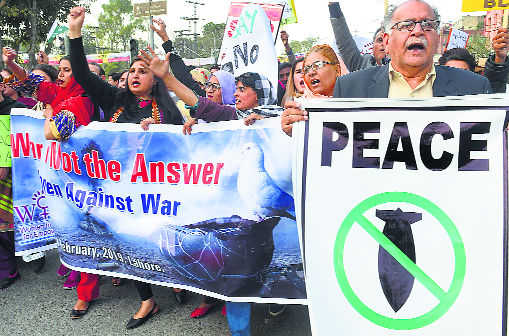
The enemy within: Pakistani people must be assured that India wishes them well. It is their ‘rogue’ army that is responsible for their miseries.
G Parthasarathy
Former diplomat
After the precision air strike by the IAF on Balakot in Pakistan’s Khyber Pakhtunkhwa province, public attention in India is now focused on bringing JeM leaders, including Masood Azhar, to justice. Ironically, Azhar would not have been such a threat today if we had not cravenly released him after being blackmailed during the Kandahar hijacking of IC 814. Those then released included Omar Syed Sheikh, who funded the 9/11 hijackers in the US and murdered American journalist Daniel Pearl.
The mass killing of Indians in terrorist strikes organised by the ISI has been a continuing feature of Pakistan’s policy since the 1993 Mumbai blasts. People seem to forget that 253 people were killed and 713 injured in the blasts. These killings were organised by the then ISI chief, Lt Gen Javed Nasir, who enjoyed Nawaz Sharif’s patronage for years. The mastermind of the 1993 blasts, Dawood Ibrahim, lives under heavy security protection in the elite locality of Clifton in Karachi. There is conclusive evidence that the attack on India’s Parliament in 2001 was organised by Masood Azhar’s JeM. A former ISI chief, Lt Gen Javed Akhtar, admitted this in 2004, in Pakistan’s Parliament. As many as 527 Indian soldiers had been killed and 453 wounded in the 1999 Kargil conflict.
When the JeM thereafter briefly receded into the background, the ISI-backed Lashkar-e-Taiba mounted yet another attack on November 26, 2008, on Mumbai, killing 139 Indians and injuring 256. This received huge international attention, as the casualties included citizens of countries like the US, the UK, France, Germany and Israel. Yet, within a few months, we were back to a ‘composite dialogue’ with Pakistan after the Sharm El Sheikh Summit, where the focus of attention was not the 26/11 terror strike on Mumbai, but unfounded allegations of Indian involvement in the freedom struggle in Balochistan! Sadly, this was a manifestation of Indian diplomacy at its worst.
The Balakot air strike was marked by the use of precision-guided Israeli Spice 2000 bombs that function with deadly accuracy. There is now conclusive evidence that the target was a JeM madrasa, which was badly damaged. Hundreds of jihadis, preparing for ‘martyrdom’ in J&K, were trained in Balakot. Our government would, however, have been better advised, if unverified claims of hundreds of casualties were not prematurely made or publicised.
What will, however, please our Russian friends is the fact that an upgraded frontline American F-16, equipped with highly sophisticated AAM-RAM missiles, was shot down by a vintage Russian MiG-21 Bison of the IAF. This again exposed the inefficiency of our Defence Ministry, which has delayed a proposal for the modernisation of the fighter fleet for over two decades. Successive defence ministers must accept constitutional responsibility for the cavalier manner in which the entire issue of modernisation has been handled. More importantly, the decision-making organisational structure in the ministry, dominated by a generalist bureaucracy, needs to be drastically restructured.
Pakistan should be made to realise that India’s air strike marks only the beginning of a new approach, which India will now undertake. Firstly, it is time for decision-makers in New Delhi to realise that our covert action capabilities on foreign soil need to be upgraded. I recently read a book on how Indira Gandhi supervised covert actions in Bangladesh in 1971, which virtually destroyed maritime communication facilities there, even before the conflict started in December 1971. The Israelis spent years developing capabilities to seek out the perpetrators of the Second World War Holocaust across the world. Their Iranian rivals have developed similar capabilities, which one saw recently, when Iran responded to a terrorist attack from Pakistani soil, which killed 29 Iranian Revolutionary Guards. In an almost immediate counter-strike across the border, over eight Pakistani soldiers were killed and a large number injured.
The time for developing capabilities for counter-strikes is now ripe. The global political, diplomatic and economic scenario in India and Pakistan has changed over the past two decades. Pakistan remains, in international perspectives, an economically bankrupt and politically dysfunctional country, which is ostensibly democratic, but run by a military elite, given to promoting religious extremism across its neighbourhood. Its actions, like hosting Osama bin Laden secretly for over a decade, promoting Taliban extremism in Afghanistan and using internationally discredited terrorist groups for jihad abroad, have sullied its image and reliability.
Islamabad is addicted to seeking doles from rich Arab neighbours, China and financial institutions like the IMF, Asian Development Bank and the World Bank. Pakistan is dependent on them for economic survival. In contrast, India is seen today as a country with the fastest growing economy. India is at peace and enjoys excellent relations with all countries (except Pakistan) in its Indian Ocean neighbourhood. It has multiple free trade and comprehensive economic cooperation agreements within SAARC and with members of BIMSTEC and ASEAN. There are, likewise, Comprehensive Economic Cooperation Agreements with South Korea and Japan.
Across its western maritime frontiers, India is the only country which enjoys excellent ties with the Gulf states, Iran and Israel. PM Modi has publicly expressed India’s thanks for US support in recent days. These developments need to be augmented by engaging people in Pakistan, making it clear that India wishes them well. It must be made known to them that their miseries are the result of actions by a rogue army, which is leading the country to economic disaster and international isolation.



























